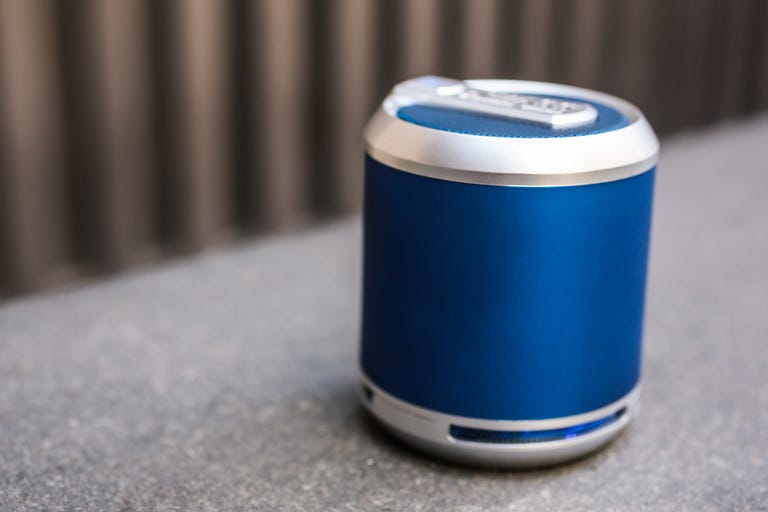 Why You Can Trust CNET
Why You Can Trust CNET Divoom Bluetune Solo wireless Bluetooth speaker review: Travels well, sounds relatively decent
As far as tiny wireless speakers go, the $49.95 Divoom Bluetune Solo stacks up well against the competition, with an attractive design, good features, and relatively decent sound.
With an ever-increasing number of tiny $50 wireless Bluetooth speakers arriving in our offices for review, the first thing I ask when I get a new one is what distinguishes it from the rest of the pack?
The Good
The Bad
The Bottom Line
When it comes to the Bluetune Solo from Shenzhen, China-based Divoom, a couple of attractive design traits, decent sound for its size, and built-in speakerphone capabilities, plus an audio output, make it worth considering if you're shopping for this type of speaker.
The first thing you notice about the Solo is that it's got a little bit of weight to it. At 8 ounces, it's not heavy, but there's some substance here, which makes it seem like less of a toy speaker.
Not much bigger than a can of Red Bull sliced in half, the speaker comes in a few different colors and has a nice texture, along with some blue lighting at its base. Some people will like that lighting and some could do without it.
There are no volume buttons on the speaker. Nor are there pause, play, or skip track forward/back buttons. Everything has to be controlled from your Bluetooth-enabled device, most likely a smartphone or tablet. A power switch can be found on the bottom of the speaker.
As far as extra features go, as I said, the Solo has an integrated microphone and can be used as a speakerphone. It works pretty well as long as you remain pretty close to the speaker when talking.
The Micro-USB port does double duty as a charging port for the integrated rechargeable battery (battery life is rated at 8 hours, which is decent though not fantastic) and an audio input (cable included).
The speaker also features an audio output, which means you can string a few of these together and augment the sound or just connect the Solo to a larger home audio system, turning the speaker into a Bluetooth receiver (translation: you'd be able to wirelessly transmit sound to your stereo from abut 30 feet away).
I thought the Solo -- a mono speaker -- sounded relatively good. Yeah, it's a little tinny (all these small speakers are), but it output a lot of sound for its small size and had some bass (the speaker incorporates something called X-Bass technology, whatever that is).
If that doesn't sound like a ringing endorsement, it isn't. It's hard to get too excited about the sound of any of these tiny speakers. Most of them, including the Solo, distort at higher volumes, and they just don't handle bass-heavy or complicated music well (I found myself cringing at times). In other words, you can stick a logo on the speaker that says X-Bass, but if you run hip-hop through this guy, it's still going to sound comparatively thin and hollow to a bigger speaker that has some kick to it. However, with other tracks, particularly simple acoustical ballads, I found myself saying, "OK, that sounds pretty good."
All that said, I'll give the Solo credit -- it held its own against the competition. I thought the $50 Oontz sounded a little better. But the Solo is smaller, easier to carry around, and has an eye-catching design. In terms of sound, it's right there with the
The $50
Conclusion
I tend to encourage people to step up to more-expensive compact Bluetooth speakers such the $99
If you fall into that category and are looking for a tiny Bluetooth speaker, the Divoom Bluetune Solo, despite having its performance limitations, sounds relatively decent (compared with other tiny $50 Bluetooth speakers at least) and has an attractive design and good feature set. It tends to sell for $49.95, but I've seen it at some online retailers for $39.99, which is what I think it should cost. At that price (and even at $49.95) it's certainly worth considering if this is the type of very portable wireless speaker you're looking for.


